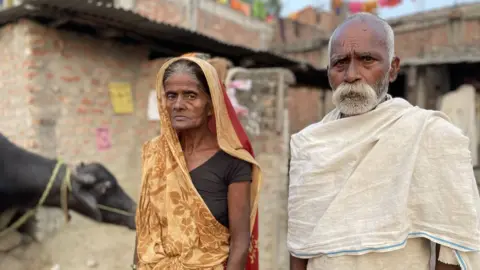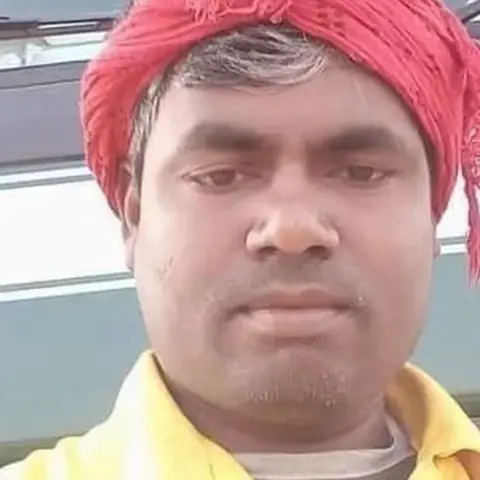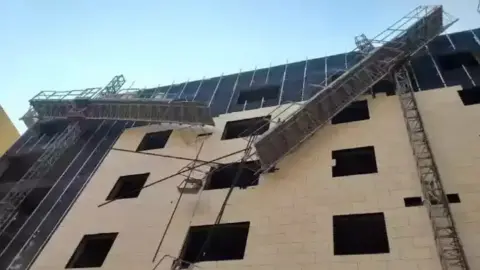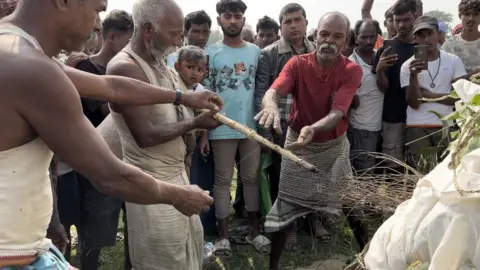Qatar World Cup: Families seek answers over migrant worker deaths
 Umesh Kumar Yadav
Umesh Kumar YadavQatar has transformed its infrastructure in the run up to the World Cup, which starts on Sunday. Millions of people from South Asia have been employed on building projects, including from Nepal - where families have told the BBC safety failures led to the death of their loved ones.
In the early hours of 10 November, Qatar airlines flight QR 644 touched down at Nepal's Kathmandu airport.
Among the cargo unloaded from the plane was a large white wooden box. "Human Remains of late Umesh Kumar Yadav, 32 years male, Nepali" was written on the outside.
In Golbazar, 250km (155 miles) south-east of Kathmandu, his father ties up his buffalo outside his brick house. He lives in one of the poorest districts of one of the poorest nations in the world, where opportunity is scarce.
When his son Umesh was offered the chance to go and work in Qatar, one of the world's richest countries, Laxman Yadav sold some buffalo to pay $1,500 (£1,250) to an employment agent who promised to arrange a job.

It's common for agents to visit impoverished areas not just in Nepal, but in Bangladesh and India, offering young men a lucrative job overseas, in exchange for large sums of money to secure them a visa.
The workers are often passed from contract to contract, making it hard for the families to know where their relatives are working, and for whom.
A two-hour drive away in the district of Dhanusha is Krishna Mandal's house. His father Sitesh left to work in Qatar four years ago.
 Sitesh Mandal
Sitesh Mandal
Sometimes Sitesh sent his son selfies while at work. "He told me he worked on water tanks, but didn't tell us too much about what he was doing," says Krishna.
Sitesh was due to return for a visit on 12 October. But just days before, Krishna got a phone call telling him his father had been killed in an accident.
A family friend said Sitesh was been working on sewage pipes, seven feet below ground in the capital Doha, when a heavy mound of earth fell onto him. His death certificate said he suffered "multiple blunt injuries due to solid object impact".
Krishna says he hasn't received a single phone call from his father's employer, or an offer of compensation. The BBC contacted the company Sitesh worked for to get a comment, but they didn't respond.
From Golbazar, Laxman didn't know too much about his son's life in Qatar - he does not own a smartphone and couldn't follow the daily updates Umesh used to post on TikTok.
In his videos, he could be seen dancing in front of Qatar's glitzy skyline or in his dorm-style accommodation with other migrant workers.
Umesh also shared clips of him at work on construction sites - smiling from on top of a ladder, or even - in true TikTok fashion - lifting heavy concrete blocks as a challenge.
On 26 October, Umesh posted a video of himself dancing at night in front of some skyscrapers running adverts for the upcoming World Cup.
It was the last post he'd ever make.
Umesh's cousin, also called Laxman, and also working in Qatar, got a call on 27 October to say he had died. He went with others to the construction site to find out how.
"They told us Umesh was taking the scaffold lift up, when it touched something and broke, and he fell down," he said.

"They should have taken care of safety at the workplace," Laxman says. "They should have checked everything and only then allowed people to work."
The BBC has been in touch with the construction company Umesh worked for - they strenuously deny a lapse in safety caused his death.
"The accident occurred as a result of his negligence and recklessness," their statement said. "The worker who died was very careless on the site and was notified many times to abide by the safety conditions like the rest of his colleagues, but to no avail."
Since World Cup construction began in Qatar, reports have emerged of the difficult conditions for and deaths of migrant workers.
Qatar's government says it is committed to "ensuring the health, safety and dignity of all workers employed on our projects". It told the BBC it has improved health and safety regulations.

But new figures given to the BBC by the Business and Human Rights Resource Centre show that in the past year there have been close to 140 cases of violations of workers' rights, with around half relating to health and safety issues.
They believe the true figure might be higher, partly due to fear of reprisal.
The BBC has seen more than a dozen death certificates of workers from across South Asia over a six-year period. Many cite the cause of death as "multiple blunt injuries". Families say they still want answers.
While Umesh's coffin made its way from the airport to Golbazar, his father Laxman and dozens of other villagers prepared for his last rites - collecting piles of wood and hay to start the fire.
In Nepal it is tradition for the eldest son to light the pyre. Laxman held Umesh's son, 13-month-old Sushant, easing a stick into the baby's tiny hand so he could start the fire.
"He used to support us. We have loans to pay, and his young children to support," Umesh's mother Sumitra said, her face wet with tears. "He was my hero."
Additional reporting by Rajneesh Bhandari, Rammohan Pateriya and Mrigakshi Shukla.
